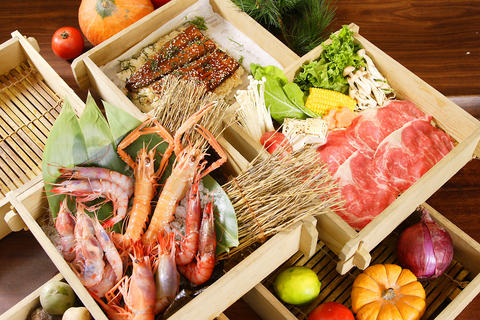Last year there were two restaurants called Wasabi on the fourth floor esplanade in Taipei 101. One, an all-you-can-eat buffet, still goes by that name. The other, a sushi bar and restaurant, has reinvented itself as Mihan 101, after the Mihan Honken restaurant in the Grand Formosa Regent hotel. The sushi bar remains, as do many a la carte selections such as tempura, but the focus now lies on food cooked at the table: shabu shabu, sukiyaki and steamers.
The latter option is being promoted until Aug. 31 with Mihan 101's "Summer Steamer Trio" (NT$1,880), a set menu for two with three steamed presentations and a variety of smaller dishes. The executive chef of Mihan 101, Tomi Wang (王祥富), explained that each of his steamed courses showcases a summer flavor: grapefruit, seaweed and perilla. Also served at appropriate intervals were fresh tofu with sesame and seafood, an appetizer trio of salmon, maguro (tuna) and prawn sashimi, soup, and fruit sorbet for dessert. Everything was simple and light, the kind of food you want on a hot summer day. The salmon and maguro, though common varieties of sashimi, impressed me as being among the freshest I've had in Taipei.
Each time the waitress placed a wooden steamer on the range in the middle of my table, Wang lifted the top and invited me to smell the fragrance that emerged as the food gently cooked. "This is grapefruit," he explained as he uncovered the first steamer, prime US rib-eye steak, cabbage and greens. "Can you smell the seaweed?" he asked as he cracked the lid on the second, shrimp and slices of fish. "This is perilla," he said, referring to the leaf that infuses the third steamer, Japanese salt-water eel sliced over rice, with a tinge of mint.

PHOTO: COURTESY OF MIHAN 101
Local ingredients were the stars of this meal. The perilla, which is often wrapped around sashimi, is grown in Yangmingshan. The fish and shrimp come from Turtle Island near Dahsi (大溪) in Ilan County, arriving an hour and a half after being loaded onto trucks at the port thanks to the recently completed Hsuehshan Tunnel. I especially liked the second course with its sweet red shrimp (胭脂蝦) and dolphin fish (鬼頭刀), which is perfect for steaming because it explodes on the palette and would be ruined in a stir-fry or soup. My only reservation was the final steamer: the slices of eel on rice seemed like a let down after the steak and fresh seafood.

In Taiwan there are two economies: the shiny high tech export economy epitomized by Taiwan Semiconductor Manufacturing Co (TSMC, 台積電) and its outsized effect on global supply chains, and the domestic economy, driven by construction and powered by flows of gravel, sand and government contracts. The latter supports the former: we can have an economy without TSMC, but we can’t have one without construction. The labor shortage has heavily impacted public construction in Taiwan. For example, the first phase of the MRT Wanda Line in Taipei, originally slated for next year, has been pushed back to 2027. The government

July 22 to July 28 The Love River’s (愛河) four-decade run as the host of Kaohsiung’s annual dragon boat races came to an abrupt end in 1971 — the once pristine waterway had become too polluted. The 1970 event was infamous for the putrid stench permeating the air, exacerbated by contestants splashing water and sludge onto the shore and even the onlookers. The relocation of the festivities officially marked the “death” of the river, whose condition had rapidly deteriorated during the previous decade. The myriad factories upstream were only partly to blame; as Kaohsiung’s population boomed in the 1960s, all household

Allegations of corruption against three heavyweight politicians from the three major parties are big in the news now. On Wednesday, prosecutors indicted Hsinchu County Commissioner Yang Wen-ke (楊文科) of the Chinese Nationalist Party (KMT), a judgment is expected this week in the case involving Hsinchu Mayor Ann Kao (高虹安) of the Taiwan People’s Party (TPP) and former deputy premier and Taoyuan Mayor Cheng Wen-tsan (鄭文燦) of the Democratic Progressive Party (DPP) is being held incommunicado in prison. Unlike the other two cases, Cheng’s case has generated considerable speculation, rumors, suspicions and conspiracy theories from both the pan-blue and pan-green camps.

Stepping inside Waley Art (水谷藝術) in Taipei’s historic Wanhua District (萬華區) one leaves the motorcycle growl and air-conditioner purr of the street and enters a very different sonic realm. Speakers hiss, machines whir and objects chime from all five floors of the shophouse-turned- contemporary art gallery (including the basement). “It’s a bit of a metaphor, the stacking of gallery floors is like the layering of sounds,” observes Australian conceptual artist Samuel Beilby, whose audio installation HZ & Machinic Paragenesis occupies the ground floor of the gallery space. He’s not wrong. Put ‘em in a Box (我們把它都裝在一個盒子裡), which runs until Aug. 18, invites